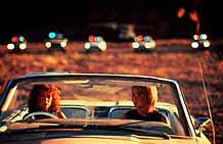 Study
Questions: Week Eleven
Study
Questions: Week Eleven  Study
Questions: Week Eleven
Study
Questions: Week Eleven
Persistent Nightmares: Domestic Dead Ends.
Thelma and Louise (1994) Saving Private Ryan (1998).
The first film in this section belongs to very durable sub-genre of American films: the road movie. Thelma and Louise focuses on a two characters who reject (or rejected by) society and set out in search of freedom and a better world. The road movie is only slightly over a half century old but its two main roots extend back through the middle ages to the classical world. The marginalized, none too honest or respectable protagonists, who wander through the world and offer their creators a point of view from which society failings and excesses may be satirized, can be found from the first-century Satyricon of Petronius through Henry Fielding's eighteenth-century novel, Tom Jones to Mark Twain's Huckleberry Finn. The other strain, that of a questing protagonist can be found in medieval romances and renaissance epics. The questing hero appears in works as different as John Bunyan's puritan allegory, Pilgrim's Progress; James Fenimore Cooper's fiction and the westerns it inspired, and in novels by J.D. Salinger (Catcher in the Rye) and Jack Kerouac (On the Road).
American beauty, exemplifies another popular film genre, the domestic melodrama. Here, however, the the conventions are turned upside down so that they satirize the values that these melodramas generally enforce (as in The Man in the Gray Flannel Suit or Peyton Place).
1. Thelma and Louise opens in a diner, and many of the films we have seen have key scenes set in diners or highway eateries. Why, would you say, does the diner appear in so many American films? What does the diner suggest about American culture?
3. From Thelma's husband, Darryl (Christopher McDonald) to the foul-mouthed truck driver (Marco St. John) the men in Thelma and Louise are a pretty dreadful bunch. To what degree does their portrayal reflect contemporary attitudes toward men in general? Views seen in books of pop psychology, the mass media, and in colleges and universities? Are there any good men in the film? Who are they, and why do you think so?
4. In American Beauty, the nuclear family doesn't seem to fare much better than men in Thelma and Louise. How many families are introduced in the film are discussed at length? How are children treated?
5. In what ways are Col. Fitts' (Chris Cooper) conceptions of fatherhood and family an ironic counterpoint to his actual experience and behavior. Consider the way he treats his wife and his son?
6. How do the way Thelma and Louise are dressed when they set out on their fishing trip symbolize their concepts of gender and their social roles? How does Thelma's changing wardrobe reflect changes in her character?
7. Why is American Beauty told from Lester Burnham's (Kevin Spacey) point of view? What makes him a better narrator than the other characters?
9. What in Thelma's background make her so vulnerable to the men she meets. How could she be taken in by Harlan (Timothy Cathcart) and J.D. (Brad Pitt)?
10. In what ways is Rickey Fitts (Wes Bentley) the mirror image of his father, Jane Burnham (Thora Birch) the mirror image of her mother (Annette Bening)?
11. As Thelma and Louise head toward Mexico, they discuss the beauty of the butte-filled landscape they are passing through. It clearly recalls the setting of John Ford's western films. At the same time, the radio plays a song about Lucy Jordan whose life in a "white suburban town" has left her, at the age of 37, without dreams. How does the combination of music, visual images, and dialogue express one of the film's central themes? What other sequences in the film use the same technique?
12. The obscene truck driver, the self-described "storm trooper of love," is wearing a baseball cap emblazoned with an American flag when Thelma and Louise teach him a lesson. How does that hat both comment on American males and turn their revenge into a political act?
13. Would Lester have rebelled in American Beauty if he had not been fired? Why? Why not?
14. What do we understand about Louise's character when she says she does not "want to end up on the damned Geraldo show"? What does she mean and why Geraldo?
15. How can we reconcile or at least explain the disjunction between Ricky's businessButch's ideals and his capacity for kindness, loyalty, and a moral vision?
16. Dreadful Darryl is easily persuaded to aid the police in heir hunt for Thelma and Louise. How are he and the police (excluding Hal) alike? How do the husband and public authorities reflect the dark side of "traditional values"?
17. What prospects for happiness are ahead for Jane and Ricky? Are they likely to be more successful than Ben and Elaine in The Graduate
18. Is Carolyn Burnham the cause of the family problems, or is she too the captive of a perverse idea of success?
19. What is the meaning of the freeze frame shot that ends Thelma and Louise? What does it say about the fate of the heroines, about their dreams of liberation?
20. Why does A Perfect World open and close with the same shot of the Burnham neighborhood? What do these images tell us about the lives of the residents? To what degree are their messages presented ironically?